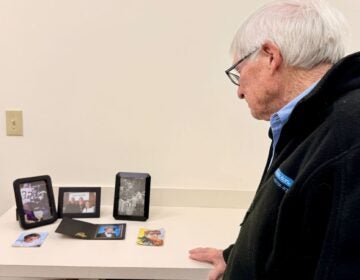Defendant in 2005 rape and murder of UD student takes witness stand
Another day of outbursts in a Wilmington courtroom. The man being tried for the second time for the 2005 rape and murder of a University of Delaware student has told a jury he smoked marijuana with the victim, but did not kill her.
James Cooke was called to the stand by his defense team at Superior Court in Wilmington, just hours after he was admonished by the judge for his behavior in the courtroom. Cooke also testified about the night of his arrest in June 2005, saying that police interrogated him for hours without a break and repeatedly accused him of killing Lindsey Bonistall in her off-campus apartment.
He said Lindsey Bonistall had come to his house twice previously in search of marijuana. “Did you ever smoke weed with Lindsey Bonistall?” defense attorney Anthony Figliola asked. “Yes,” Cooke replied. Cooke also claimed he had sex with her.
Cooke said he told police during the interview that he did not know Lindsey Bonistall because he felt they were accusing him. Cooke also denied writing anything on the walls of Bonistall’s apartment, which was set on fire. Her body was found in a bathtub in April 2007.
Shortly after Tuesday’s session began, Judge Charles Toliver ordered Cooke out of the courtroom when he objected to the prosecution’s questioning of Cooke’s sister, with whom he was staying in Wilmington near the time of his arrest. Outside the presence of the jury, Cooke said cops had “planted stuff” belonging to him that was found in her sister’s apartment and seized by police. Cooke was admonished not to raise objections himself, but only through his attorneys. Cooke continued to argue with the judge, at which point he was ordered out of the courtroom. He returned after consultation with his lawyers.
Cooke claimed that on the final weekend of Lindsey Bonistall’s life, he was with her at her apartment and that she had come from a party and appeared to be drunk. Prosecutor Steven Wood confronted Cooke during cross-examination with the work timecard from her part-time job which indicated she was at her waitress job during the time Cooke said he was with her. Wood also reminded Cook about the testimony of co-workers and an acquaintance who were able to identify him as the person in surveillance photos taken where a stolen credit card was used at an ATM.
Wood also pointed out similar writing patterns in letters sent from prison and signed “James Cooke” and writing found on the walls of Lindsey Bonistall’s apartment and at the scene of another burglary that Cooke was charged with. Cooke said he had no knowledge of the letters and implied he did not write them.
After more combative questioning, Cooke said “this man is framing me.” That led Judge Toliver to clear jurors from the courtroom once again, leading to another testy exchange between Cooke and the judge.
“You can look at me any which way you want, but I wouldn’t press it,” Toliver said to Cooke.
Cooke’s original 2007 conviction and death sentence were overturned on appeal. The Delaware Supreme Court ruled that his previous lawyers did not act in his behalf when they pursued a defense of “guilty but mentally ill.” Cooke maintained he is innocent.
When his second trial began in early March, Cooke attempted to act as his own attorney. Judge Toliver ordered his former back-up lawyers to lead Cooke’s defense after days of outbursts from him in court.
After the jury had been dismissed for the day, Cooke was given one more opportunity to address the court. He raised a list of objections, including the inability to use his own witness list. Cooke also said the time sheet was “foul play, and alleged “prosecutor misconduct.”
“I’m not getting a fair trial,” Cooke said.
The jury is expected to get the case Wednesday following closing arguments.
WHYY is your source for fact-based, in-depth journalism and information. As a nonprofit organization, we rely on financial support from readers like you. Please give today.




